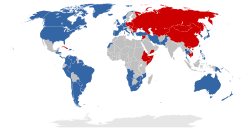
Back الكتلة الغربية Arabic لكتلة لغربية ARY Qərb bloku Azerbaijani Западен блок Bulgarian Západní blok Czech Vestblokken Danish Westmächte German Δυτικό Μπλοκ Greek Okcidenta Bloko Esperanto Bloque occidental Spanish
This article needs additional citations for verification. (June 2014) |


The Western Bloc, also known as the Capitalist Bloc, was an unofficial coalition of countries that were officially allied with the United States during the Cold War of 1947–1991. While the NATO member states, in Western Europe and Northern America, were pivotal to the bloc, it included many other countries, in the broader Asia-Pacific region, the Middle East, Latin America, and Africa with histories of anti-Soviet, anti-communist and, in some cases anti-socialist, ideologies and policies. As such, the bloc was opposed to the political systems and foreign policies of communist countries, which were centered on the Soviet Union, other members of the Warsaw Pact, and usually the People's Republic of China. The name "Western Bloc" emerged in response to and as the antithesis of its communist counterpart, the Eastern Bloc. Throughout the Cold War, the governments and the Western media were more inclined to refer to themselves as the "Free World" or the "First World", whereas the Eastern bloc was often referred to as the "Communist World" or less commonly the "Second World".